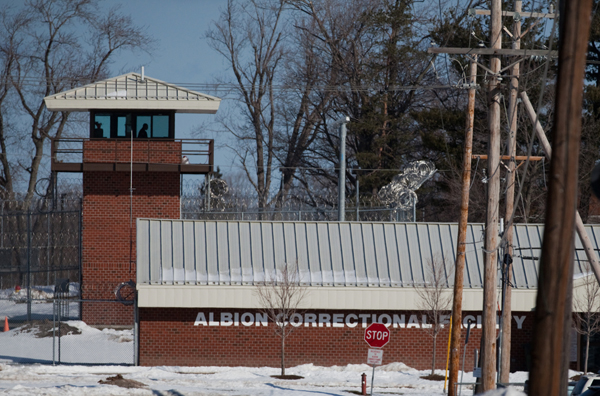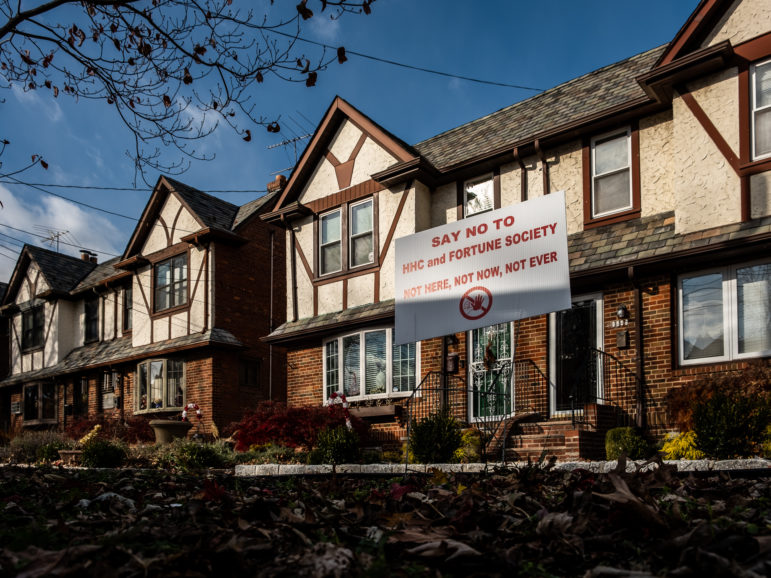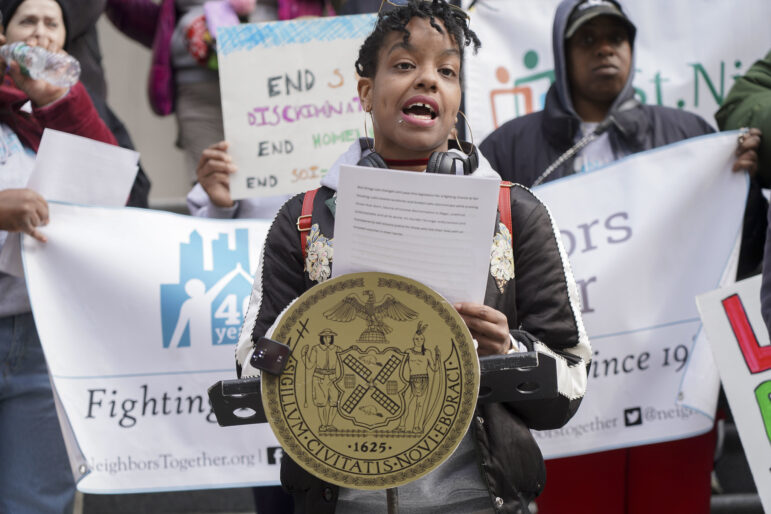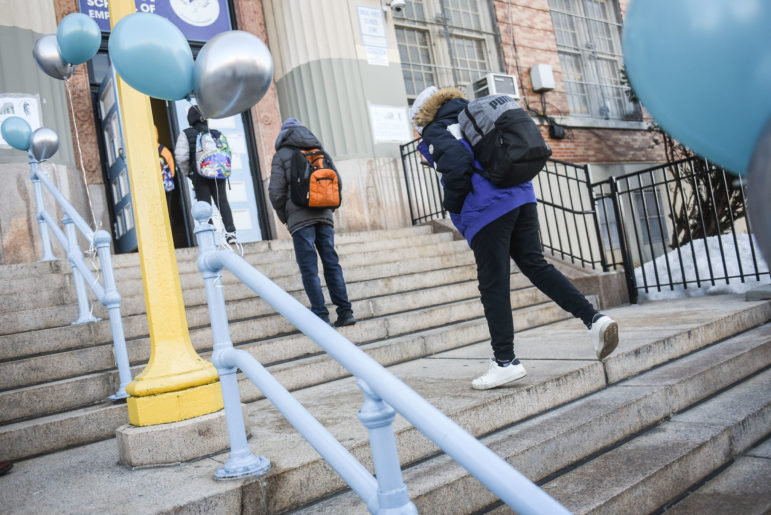
Photo by: Marc Fader
According to the Correctional Association of New York, approximately 40 percent of incarcerated mothers from New York City are incarcerated at Albion Correctional Facility located just west of Rochester—approximately 375 miles or about an eight-hour drive from the city.
It was early morning, March 2009. Angelica, 3, was fast asleep with her mother in a bed at the back of her grandmother’s apartment in Astoria, Queens, when 10-15 police officers entered with a warrant to raid the apartment for drugs.
For Angelica’s mother, Jessica Venegas, drug dealing had been a normal part of growing up, and it seemed normal to her and her brother to make their money that way too. While Venegas sold her drugs on the street away from her daughter, it was her brother’s drugs, sold out of their mother’s home, that the police were looking for that early morning.
The sleep of small children can be otherworldly, and that night Angelica slept on, in another world, while the police yelled to Venegas to get up out of bed, and Venegas yelled back to take care, that she was there with her daughter. Angelica slept while the police ransacked the apartment and handcuffed her mother, her uncle, and her grandmother, guns drawn. Miraculously, she slept while her uncle’s two pit bulls hovered over her protectively, growling at the police to stay back. She slept while the police captured the dogs, cutting their jaws and splattering their blood on the floor and the walls in the process.
And then it was time to wake Angelica up.
There were the officers, with their badges, their guns and their walkie-talkies. There was her mom, in handcuffs. And there was the blood. But nobody explained anything to Angelica. The female officer simply dressed her and asked who could look after her. Venegas said they could take her to a neighbor until her sister came.
“You don’t deserve to have your child,” Venegas recalls one of the male officers telling her. Then motioning to the female officer, he added: “You’re lucky. If it weren’t for her, we’d be sending your daughter to child protective services and you’d never see her again.”
As Venegas sat on her brother’s bed and looked out at her daughter standing silently in the hallway staring back at her, she thought to herself: “I can’t believe I let this happen. I can’t believe I let her down.”
Growing consciousness about impact of arrests
Twenty-five years ago, one out of every 125 children in the United States had an incarcerated parent. Today, that number is one out of every 28.
That includes an astounding one out of every 9 black children, one out of every 28 Latino children, and one out of every 57 white children, according to a 2010 Pew Charitable Trusts report. Despite newsworthy declines in the number of people incarcerated in New York state over the past decade, over a 100,000 children have a parent in a New York state prison or jail. Two-thirds of those parents, and 83 percent of mothers, were incarcerated for non-violent offenses.
Nobody knows just how many children are present during the time of their parent’s arrest, because to date, nobody tracks those numbers. But a recent survey by the New York State Division of Criminal Justice Services (DCJS) found that nearly one-fifth of parents surveyed (18 percent) reported that their child had witnessed their arrest. Of those, all but one had also been handcuffed in front of their child, while 9 percent said their child had witnessed guns drawn.
The fact that the government has begun to collect these numbers is significant, because for a long time, the trauma suffered by children during their parents’ arrest and incarceration was a relatively invisible phenomenon. “For many years, I believe there was an unspoken, unconscious assumption that children of the incarcerated were guilty by association, and were therefore in a different category than other children, so we just didn’t think about them,” says Ann Adalist-Estrin, director of the National Resource Center on Children and Families of the Incarcerated.
But slowly over the past decade, as greater attention has been focused on the human and taxpayer cost of mass incarceration, attention has also begun to be paid to the toll that a parent’s arrest and incarceration takes on children. Studies show that children experience their parent’s incarceration in many of the ways children experience a parent’s death, and suffer from mental health problems at far higher rates than children in the general population. Moreover, after witnessing an arrest, children often feel very angry, scared and guilty for being unable to protect their parents, explains Susan Chinitz, professor of clinical pediatrics and director of the Early Childhood Center at the Albert Einstein School of Medicine.
In one sign that the experiences of these children may be beginning to penetrate mainstream consciousness, later this year Sesame Street will release a new campaign aimed at helping children figure out how best to go on living their lives with a parent living behind bars. In another, this past winter, two bills introduced for the second time into the New York state legislature aim to minimize the trauma children suffer when arrest and incarceration become part of their reality.
New rules for cops
The first bill would require the state’s Office of Children and Family Services and DCJS to work together to ensure that arrangements are made for the care of children when a primary caregiver is arrested. The law is broadly worded, but it’s most specific provisions allow police officers to give an arrested parent additional phone calls beyond the typical one in order to arrange for child care, and provide them with information about community-based resources to help them. The report by DCJS found that only 15 percent of parents surveyed said the arresting officer had inquired whether they were responsible for the care of children, and only 11 percent said they’d been allowed to make arrangements for their children.
The law would also mandate that law enforcement officials receive training on how to minimize trauma when a child is present at the time of arrest, and require that police departments have a written protocol detailing steps officers should take to minimize the trauma to a child.
A 2010 report by the New York State Council on Children and Families found that children are often out of the home during the time of a parents’ arrest, in part because police already do attempt to plan their raids in a way that keeps children out of harm’s way. But in a series of focus groups with children of incarcerated parents and their caregivers both upstate and in the New York metropolitan area, the report’s authors found that when children were present, the attitudes of officers varied widely.
One woman recalled the efforts officers took to shield her children from unnecessary trauma: “They didn’t use handcuffs or force [my husband] in any way…They told me everything they were planning to do and made sure the kids didn’t see anything.” But another recounted: “They took my daughter out handcuffed and one cop told the kids, ‘This is the last time you’ll see your mother.’ When my daughter asked if she could kiss her children good-bye, the officer said, ‘No bitch, you’re going outside.'” The report found that treatment by officers was not related to the severity of the crime.
Tanya Krupat, program director at the Osborne Association, notes that some jurisdictions already have policies in place to minimize the impact a parent’s arrest has on children. But, she says, “There isn’t quality assurance. There isn’t standardization. Children’s well-being is too important to leave to someone’s discretion.” Krupat remembers vividly one little boy who described a nighttime raid in which his mother and her boyfriend were arrested, and his dog was shot. “He described it to me many years after it happened as if it were happening right then,” says Krupat.
The measure passed the Assembly last month and is awaiting Senate action. Krupat believes the bill, which is sponsored by state Senator Velmanette Montgomery and Assemblymember Joseph Lentol, may also help address the secondary trauma police officers themselves sometimes suffer when a child is present at the time of an arrest. She recalls hearing about one officer in California who left a child with the neighbor, but never felt quite sure if the child would be safe or well cared for. “At night he lay awake wondering if he had done the right thing,” recounts Krupat.
To date, no New York law enforcement agencies have signed on in support of the bill. Although Krupat says she has received positive responses from some police chiefs around the state who say there is a need for better training and polices, she also frequently hears that officers are already sensitive to children, and that the police don’t need another unfunded mandate. But when the Osborne Association did a review of statewide law enforcement training, they didn’t find any material on child development. Krupat adds that the New York City Police Department’s Patrol Guide is vague and confusing when it comes to handling an arrest where children are present.
Several years ago, in cooperation with the Osborne Association, The New York State Association of Chiefs of Police took the initiative to develop its own protocol for minimizing the impact that an arrest has on a child it hopes will be used as a guide for police departments around the state.
Included as an Appendix in the New York State Law Enforcement Handbook each year since 2010, the protocol suggests that officers attempt to schedule arrests when children are not likely to be at home and provide parents assistance in making arrangements for the care of their children. It also suggests that when children are present, and whenever safe, officers consider handcuffing and questioning parents out of the view of children, allowing parents a chance to reassure their children, and offering older children information about where a parent will be taken, how long a parent will be held, and how children can visit.
Chief Mark Spawn, who was the police chief in the Oswego County town of Fulton, N.Y., for over a decade, is responsible for developing the protocol for the association.
Spawn spent over two decades on the force, and he says that even when parents actively risked their own children’s well-being—using a baby in a stroller to conceal shoplifted merchandise, for instance, or engaged in more egregious crimes, including using a weapon with their children present—he saw police officers making efforts to minimize the trauma experienced by children. “At target locations, we might even put surveillance out for kids returning home. If the school bus is coming down the street, we can’t give up the secrecy of the search warrant, but we can stall the bus a couple of blocks away.”
But police work is unpredictable, says Spawn. “Despite all the planning, you may expect three people inside when the door comes down and you get 30. You may not expect weapons, and you get them,” which is why the association’s protocol is so heavily qualified with words like “if possible,” and “giving due consideration to the safety of officers.”
Nonetheless, Spawn says, he has heard stories of children traumatized by arrests, adding: “I am smart enough to know that there are situations in which we could do better.”
Locked up, but closer to home
The second piece of legislation, sponsored by state Senators Gustavo Rivera and Montgomery and Assemblymember Marcos Crespo, would make a parent’s proximity to his or her children one of the factors considered when the state decides where to send people to serve their sentence. While the bill is being sold first and foremost as a benefit to children, its sponsors in the state Senate and Assembly also hope it will have a public safety benefit, since studies suggest that prisoners who are able to maintain family ties have lower recidivism rates than prisoners who don’t. Not surprisingly, according to the bill, contact between children and parents “is also the single most important factor in determining whether a family will reunify” after a parent is released from prison.
Proximity to children is already considered in a number of states, including New Jersey, Florida and California, but it would be an important rethinking of priorities for New York, since today, 70 percent of New York’s prisoners are in prisons over 100 miles from their homes. Male prisoners at Lakeview Correctional Facility who come from New York City are more than 400 miles from home, and female prisoners from New York City housed at Albion are approximately 375 miles from home, or about an eight-hour drive. According to the Correctional Association of New York, approximately 40 percent of incarcerated mothers from New York City are incarcerated at Albion.
Moreover, the report released this year by DCJS found that while 78 percent of parents surveyed had some kind of contact with their children during their incarceration, only 42 percent of children had a chance to visit their parent in person, with 58 percent of parents reporting that distance was a major barrier to visiting. In a Kafkaesque scenario, a significant number of prisoners reported that even phone conversations with their children were logistically impossible, with 44 percent of respondents who answered questions about telephone contact indicating that their children’s phones could not accept collect calls, 30 percent indicating that collect calls were unaffordable, and 17 percent responding that their children did not have access to a phone at all.
Of course, issues surrounding the relationship between a child and an incarcerated parent aren’t just about distance or logistics. The New York State Council on Children and Families 2010 report captured the ambivalence children often feel visiting their parents in prison.
For many children, the report found, visiting gave them a chance to see that their relationship would continue, after the initial separation that brought such an abrupt end to life as they knew it.
But the report also noted how awkward, upsetting and scary visiting a parent in prison could be, and that it sometimes caused children to relive those early feelings of loss. “I like to phone my father because it feels more like he is at home” said one child. “The visit is more real because you see him sitting there and it hits you hard where he is.” The report also found that as children grew older and entered adolescence, they often felt increasingly angry at their parent for the losses they’d had to live with, and, at times, chose to have nothing more to do with the incarcerated parent.
In part that’s because parents who go to prison have sometimes been living lives that were chaotic, or violent, or unpredictable in some way even before they were arrested.
But even when children do feel profound ambivalence toward their parents, research finds that for most children it is also deeply important to have the opportunity to keep connections. “Kids keep that sense of wanting to know their parent, wanting to be with their parent, wondering about their parent no matter what the circumstances,” says Chinitz. “There’s so much personal despair that comes with not having a parent in your life. When children are left alone with their imagination,” Chinitz adds, “they tend to think they themselves did something wrong and they tend to idealize their father or mother. But none of us functions very well in the world if we idealize our parents beyond a certain age.”
A memory surfaces
For Venegas, the instability in her life came in the form of a heroin addiction, which she struggled with both before and after the two months she spent locked up, until about a year ago, when she successfully completed rehab. Amid her addiction, she says, she tried to be a good mother: “I would go get my drugs and come home, cook dinner, do laundry, take my daughter to the park.” But Venegas also knew, on some level, that she was putting her relationship with her daughter at risk. She had even had papers drawn up granting her sister parental rights in case she died or was killed or was locked up for a long time.
After she was arrested, Venegas hoped her daughter was too young to have processed the guns, the blood and the handcuffs, and she was afraid that if she told her the truth, her daughter’s trust in her would be broken. So instead Venegas told her a lie many incarcerated parents tell their children: that she was away at school. “I just called her to let her know, ‘I’m here. I’m alive. I didn’t leave you. I’ll be back soon.’ My mom and my brother called her. We all reassured her, and we hoped she wouldn’t ask any more questions.”
But when Venegas came home, she found her daughter quieter and less free-spirited than she used to be. She seemed less taken up with her imaginary friends, frightened of the police and more concerned about real-world responsibilities. Venegas says five years later, her daughter is “8 going on 18.”
In part that’s because children of parents who have struggled with addiction often take on adult responsibilities. But Venegas also believes her arrest and incarceration left its own indelible mark. Even though Angelica often acts like a little adult, she also continues to insist that her mother lie down with her every night when she falls asleep. “If I go downstairs,” says Venegas, “she’ll ask me, ‘Where are you going?’ If I say I’m going to the laundry, she’ll say, ‘Are you sure you’re coming right back?’ She just has a very tight grip on me.”
Still, for many years, Venegas didn’t know whether her daughter remembered the night Venegas herself was arrested, until recently, when Angelica overheard another mother talking about the time she’d spent in prison, and revealed that she remembered everything. “Remember when you were in handcuffs, and Uncle and Nanny were in handcuffs, and the police hurt my dogs?” she said.
“It kind of broke my heart,” says Venegas, “because I don’t ever want to know that my child remembers such a terrible experience.” But, Venegas says, she is also relieved that her daughter finally felt able to share her memories with her. “If she could finally tell me that,” says Venegas, “she can tell me a lot more.”









One thought on “Pushing Cops to Consider Kids When Arresting Parents”
I had no idea in this day and age that police acted so callously when arresting a Mother. My Granddaughter was siting with her Mother upstairs in her Mother’s bedroom when a bunch of police officiers charged the bedroom, running in and grabbing the Mother and handcuffing her. My Granddaughter who is only three years and 11 months was crying uncontrollably and very fightened. Later that night she told me in my home at bedtime that the policeman told her that her Mother was going away and needed some rest. My Granddaughter could not sleep that night and finally my Son came to get her once released from jail at midnight. Is there not a better way to handle parents being arrested. This happened in a very small town and my Son and his Wife were no danger to anyone. Could they not have called us to pick up the child first. My Granddaughter will be traumatized for life.